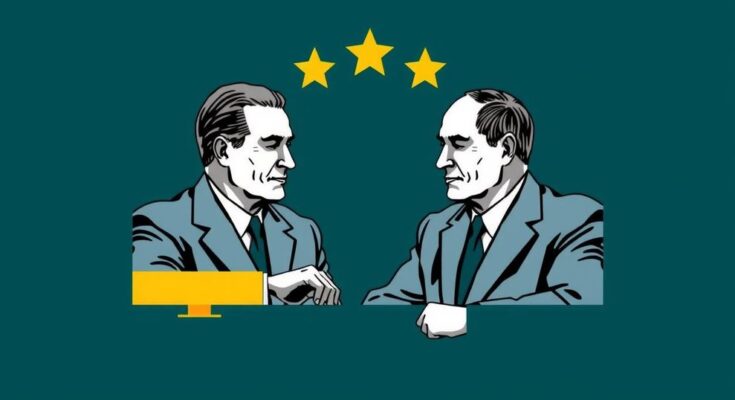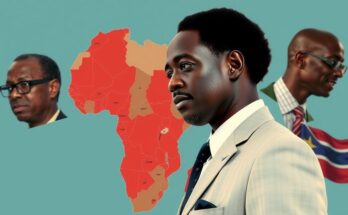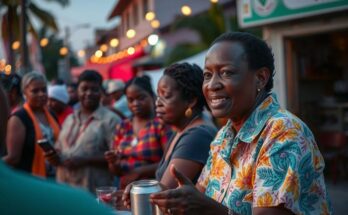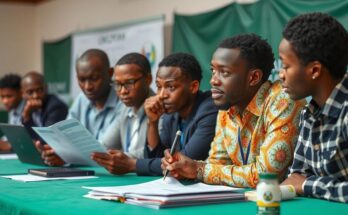President Félix Tshisekedi of the Democratic Republic of Congo is proposing a constitutional review, which has raised opposition concerns over potential power extension. Tshisekedi plans to establish a commission for drafting a new constitution that reflects Congolese values, but opposition leaders firmly reject this move, fearing it aims to consolidate power. Key figures within the opposition vow to resist any changes, citing risks to democracy and stability in the DRC.
The Democratic Republic of Congo is currently considering a constitutional review, a move that has raised significant concerns among the opposition regarding its potential implications for President Félix Tshisekedi’s tenure. In recent discussions, Tshisekedi argued for a “worthy” constitution that aligns with Congolese nationalism. During his visit to Kisangani, he announced plans to establish a national commission composed exclusively of Congolese citizens from various disciplines, tasked with drafting a new constitution reflective of the nation’s realities. He emphatically stated, “This constitution is not good. It was drafted abroad, by foreigners. Our constitution must be based on our way of life.” The current constitution was adopted in 2006 following a referendum aimed at eradicating violent power struggles and fostering democratic elections. Opposition voices, including those from the late Étienne Tshisekedi, had previously called for its rejection. Following President Joseph Kabila’s unsuccessful attempts to reform the constitution in 2015, the current considerations for alteration come at a time when Tshisekedi’s party, the UDPS, has begun advocating for constitutional reform. Augustin Kabuya, the interim chair of UDPS, remarked that the constitution “has demonstrated its limitations in the exercise of public power; it has to evolve to be properly adapted to the political management and progress of Congolese society.” While there has been no official indication from the UDPS regarding a desire to amend term limits, Tshisekedi has indicated that any such alterations would require the people’s sanction, asserting, “To change that, only the people can decide, not the president.” Nevertheless, debates within the party suggest some leaders believe the president has essentially been serving only three years of a five-year term due to extensive delays in governance formation processes. Tshisekedi criticized the existing constitutional structure for hindering governmental efficiency, citing a delay in the establishment of his government after his inauguration. He seeks a constitution that ensures the seamless operational capacity of state institutions. However, many opposition leaders perceive this constitutional review as a strategy aimed at consolidating power, with Olivier Kamitatu, spokesperson for opposition leader Moïse Katumbi, expressing concerns that it is intended “to enable Félix Tshisekedi and his clan to retain power for life.” Opposition figures, including Martin Fayulu, have pledged to obstruct any attempts to amend the constitution, asserting that they will mobilize public support to resist changes. The Catholic bishops have also advised against pursuing constitutional revisions, cautioning that such moves could destabilize an already fragile political landscape, highlighting concerns over self-serving political motivations. In summary, the nation stands at a critical juncture regarding potential constitutional revisions, with opposition leaders united in rejecting any proposals that could jeopardize democratic principles and governance stability in the Democratic Republic of Congo.
The Democratic Republic of Congo’s constitution, adopted in 2006, was designed to promote stability following a tumultuous political history characterized by violence and power struggles. The recent contemplation of constitutional amendments comes amid President Félix Tshisekedi’s term, where his administration seeks to enhance the constitution to better reflect Congolese governance and national identity. The opposition, however, has raised alarms about the possibility of such changes being a guise for extending presidential power, recalling previous attempts by former President Joseph Kabila to reform the constitution for similar purposes. Given the socio-political context of the DRC, the potential constitutional review has ignited deep divisions between the ruling party and opposition factions, all while key national institutions remain fragile.
The current discussions surrounding the review of the Congolese constitution underscore the contentious nature of political governance in the Democratic Republic of Congo. With President Tshisekedi advocating for changes, asserting the need for a constitution that resonates with Congolese values, the opposition remains steadfast in its resolve to block any efforts perceived as self-serving or detrimental to democratic structures. As positions harden, the outcome of this debate may significantly shape the political landscape and institutional integrity of the DRC.
Original Source: www.theeastafrican.co.ke




